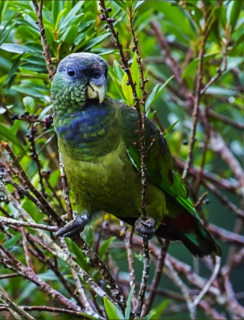Scaly-headed Parrot |
|
|
Also known as: Maximilian's Parrot or Pionus, Tucuman Parrot (P.m. lacerus)
Photos
View in GalleryDid You Know?
The Scaly-headed Parrot or Pionus gets its name from the grey scalloped feathers on its head, which give it at scaly appearance.Academic Research
Related publications: Pionus maximilianiSpecies Profile
Genus: Pionus | Species: maximiliani
Size:
29cm (11.3 in)
Weight:
233-293g (8.1-10.2 oz)
Subspecies including nominate:
four: P.m. maximiliani, P.m. melanoblepharus, P.m. siy, P.m. lacerus
Colour Adult:
P.m. maximiliani: Both adults in general dull green; underparts paler and more bronze/brown, with feathers margined dusty brown; green/black forehead and lores; dull blue chin and band across throat; red undertail coverts tipped with blue and yellow/green; green tail with red at base. Bill dull yellow with dark grey at base. Eye ring bare and white with grey spot in front of and behind eye. Eye dark brown.
P.m. melanoblepharus: Both adults band on chin and throat darker blue; darker green back and underparts. Larger in size.
P.m. siy: Both adults as in melanoblepharus, but with blue/purple chin and throat band; some upper breast feathers with red bases; bronze/green of back and underparts paler.
P.m. lacerus: Both adults as in siy, but deeper blue and more extensive throat band.
Colour Juvenile:
P.m. maximiliani: Paler green head with less pronounced scalloping to feathers; reddish forehead; minimal blue on throat.
Call:
Calls made in flight are resonant choik-choik usually heard from far off; while at rest emits a series of rapid notes and harsh squawks, interspersed with low clucks.
Listen NowVideo Links:
Video 1 | Video 2More Information:
Content Sources:
CITES
BirdLife International
Cornell Lab of Ornithology/Birds of the World
Parrots: A Guide to Parrots of the World, Juniper and Parr, 1998
ML Media Collection Catalogue 115444, Scaly-headed Parrot Pionus maximiliani, Marantz, Curtis, Espirito Santo, Brazil, Dec. 16 1999, Cornell Lab of Ornithology. Site
Parrots of the World, Forshaw and Cooper, 1977. 2010 edition
Parrots of the World, Forshaw, 2006.
Lexicon of Parrots, Thomas Arndt.
Parrots in Aviculture, Low, 1992.
Parrots: Their Care and Breeding, Low, 1986.
Psittacine Aviculture, Schubot, Clubb and Clubb, 1992.
Photos
View in GalleryDid You Know?
The Scaly-headed Parrot or Pionus gets its name from the grey scalloped feathers on its head, which give it at scaly appearance.Academic Research
Related publications: Pionus maximilianiSpecies Care
Captive Status:
Fairly common
Longevity:
20 yrs
Housing:
Aviary or suspended enclosure, minimum length 2-3m (6.5-9.8 ft).
Diet:
Fruit such as: apple, pear, orange, banana, pomegranate, cactus fruits, forming about 30 percent of the diet; vegetables such as: carrot, celery, green beans, peas in the pod; fresh corn; green leaves such as: Swiss chard, lettuce, sowthistle, dandelion, chickweed; spray millet; small seed mix such as: canary, millet, and smaller amounts of buckwheat, oats, safflower and a little hemp; soaked and sprouted sunflower seed; cooked beans and pulses and boiled maize; complete kibble.
Enrichment:
Not a hard chewer; needs regular exercise so provide as large an aviary as possible. Provide shallow water bowls or overhead misters for bathing. Also provide ladders, swings, ropes, different sized perches and foraging/puzzle toys.
Nest Box Size:
Vertical box, 12" x 12' x 18" or 12" x 12" x 24" (30.5cm x 30.5cm x 46cm or 30.5cm x 30.5cm x 61cm).
Clutch Size:
4-5
Incubation Time:
26 days
Fledging Age:
9-10 weeks
Hatch Weight:
9g (0.3 oz)
Peak Weight:
Not recorded.
Weaning Weight:
197g (7 oz)
Photos
View in GalleryDid You Know?
The Scaly-headed Parrot or Pionus gets its name from the grey scalloped feathers on its head, which give it at scaly appearance.Academic Research
Related publications: Pionus maximilianiSpecies Wild Status
World Population:
Unknown, decreasing.
IUCN Red List Status:
Least Concern
CITES Listing:
Appendix II
Threat Summary:
Not globally threatened. Decline in some parts of range (N Argentina) due to wild bird trade, with 67,851 birds exported from 1981–1990 alone. Elsewhere less numerous because of habitat loss. Since 1981 there have been 93,234 individuals traded on the international market.
Range:
P.m. maximiliani: NE Brazil, from Ceara, Piaui and S Maranhao south to Espirito Santo, C Minas Gerais, and S Goias.
P.m. melanoblepharus: C Brazil, from S Goias and southern Minas Gerais, south to E Paraguay and NE Argentina, in Misiones and Corrientes.
P.m. siy: Mato Grosso, Brazil, to C Bolivia, Paraguay and N Argentina, in Formosa and Chaco.
P.m. lacerus: NW Argentina, in Catamarca and Tucuman to S Salta and W Chaco.
Habitat:
Found up to 2000m (6560 ft) in various habitats from lowland dry forest to dry caatinga and seasonal cerrado savannas. Also found in more humid forest such as gallery woodland and Araucaria sp. forest and subtropical forests on east Andean slopes.
Wild Diet:
Feeds on Erythina, Inga, Piptadenia, Copaifera, Croton, Pachystroma, Plathymenia reticulata, Ficus and Araucaria nuts.
Ecology and Behaviour:
Tolerant of human disturbance of forest habitats and sometimes cultivated sites. Social; forming large flocks where food abundant. Roosts communally in tall tree-tops.
Clutch and Egg Size:
4-5 broadly elliptical to short ovate eggs, 32.5 x 24.5mm (1.3 x 0.9 in).
Breeding Season:
October-December. Nest is in tree hollow.
Related Links:
Photos
View in GalleryDid You Know?
The Scaly-headed Parrot or Pionus gets its name from the grey scalloped feathers on its head, which give it at scaly appearance.Academic Research
Related publications: Pionus maximilianiMembers Only Resources
Please log-in now to find more research, resources and tools.
Not a Member?
Find more great information:
Gain exclusive access to 600+ pages of additional research, seminars and podcasts, specialists to ask your toughest questions, and dozens of other fun resources - when you become a WPT member.
Join Today >>

































